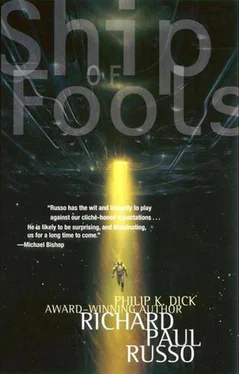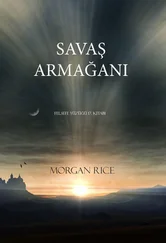That was it for the day. Barry Sorrel and the other science-team members wanted to use the last of daylight to explore the town, but Thornton, Sari Mandapat, and I overruled them, and we all returned to the shuttle. There was no hurry. The dead there had been long dead, and the living had nowhere to go.
Father Veronica remained until dark standing at the edge of the pit, presumably praying; then she, too, returned to the shuttle. I wanted to talk to her about the graveside ritual, but she said she needed to be alone. She gave me a copy of the text she had spoken from (I still have it), then retreated to one of the armored land vehicles and shut herself inside.
There was no translation for the text, no explanation, but I read it over several times, quietly aloud; the sound and rhythm of it gave me an unexpected sense of comfort.
Aviolent storm blew in during the night, and it only worsened throughout the day. I couldn’t see the settlement through the viewing windows or on the monitors, just the vaguest of dark outlines through the torrential rains crashing down from the black clouds above us.
It was odd. Stuck inside the ship for all these years, searching for a habitable world, waiting for the chance to walk on solid ground once again, maybe even breathe open air, and now that we’d landed we were trapped inside a small metal vessel with far less freedom and space than we would have had if we’d still been aboard ship.
The storm raged on. Three days and it never let up. We barely managed to get daily transmissions through to the Argonos , apprising them of our status.
Father Veronica went out into the storm the morning of the third day. Sergeant Woolf wanted to take one of her soldiers and go after her, but I persuaded her to stay with the shuttle. I reminded the sergeant of her duty to the ship and the exploration team, arguing that if she or one of her soldiers were lost, she would put us all at greater risk. I didn’t believe any of it, but I felt that if Father Veronica needed to go out into the storm, she should be allowed to do so.
She returned several hours later. The shuttle’s security/ detection system apparently wasn’t functioning, for we only knew of her return when we heard her banging on the shuttle’s hull. We lowered the embarkation ramp, and had to help her inside; she was so wet and exhausted she could barely walk, but at the same time she looked refreshed and somehow invigorated. She wouldn’t answer any questions. She dried off and changed into another cassock, then settled down in silence to read from an old bound book with thin, translucent pages. She appeared content and peaceful, and I thought that maybe we should all make trips out into the storm.
THEstorm broke during the night, and the sun rose bright and radiant on the fourth day, lighting up stray clouds with red and purple, bringing light and warmth to the silent, empty buildings. Steam rose from the river, from the building rooftops, from the mud, from the trees surrounding the town—antediluvian jungle.
I was the first to leave the shuttle, and stood alone beside it, my face and lungs exposed to the air of this world. I had decided to abandon the breathing apparatus—people had lived here long enough to build a settlement; it probably wasn’t anything in the air that killed them, and if it was… I’d accept whatever came. For some reason, I felt comfortably reckless.
Without the breather, the smells were intense. Exotic and strange and exhilarating. More than ever, I knew I was on an alien world, my mind trying to identify so many odors that didn’t match anything I’d ever experienced.
The air was nearly silent. But as the sun climbed, sounds of life finally emerged from the woods—animals presumably, although the clicks and chitters and rustlings and mewling cries sounded distinctly alien, as they should. This was an alien planet, alien to human beings, alien certainly to those human beings who had landed here just days ago.
Then there was another sound, a low and quiet yowling. Not from the woods, though; this time the sound came from one of the nearest buildings. I turned and stared in the direction of a long, weather-beaten structure, at the open doorway and shattered windows.
A large cat stepped through the doorway and emerged into the sunlight, staring back at me. The cat was larger than any I’d ever seen on the ship. The low yowling became almost a growl, and its tail, fat and puffed, twitched stiffly.
I squatted and reached out a hand.
The cat hissed, then ran off toward the trees.
I was filled with a wonderful sense of peace and contentment, and wished that none of the others would leave the shuttle.
BUTthey did, and the exploration of the settlement resumed. The ground was still muddy, and moving about was tiresome and sloppy. I lost interest before noon. Buildings filled with rotting furniture, broken doors and windows, warped and mildewed floors and walls, unrecognizable masses and shafts of rusting metal. I doubted anyone would discover anything useful, anything to tell us what had happened.
Leaving the others to explore, I went down to the river at midday. The remains of a crude dock extended three or four meters into the water, although it was clear that at one time the dock had been much longer. When I took a few steps onto it, the wood was so decayed I sank slightly into it, and the entire structure creaked and swayed, threatening to collapse beneath me. I backed off and sat on a section set into the bank and watched the muddy water flow past.
The water was hypnotic, so that I lost all sense of time, and even a sense of place. This was only the second time in my life that I had seen a real river—it felt so different from the small, artificial streams that flowed in the nature rooms on board the ship. Vast and uncontrolled and somehow alive.
I heard a noise and looked up. Father Veronica stood just a few feet away, watching me.
“Why are you here?” she asked.
“The settlement doesn’t interest me,” I told her. “Digging through the mud and the rot of the past…” I shook my head. “Not when it’s so unlikely that any answers will be found.”
She didn’t reply at first, and it seemed she was bothered by my answer, or made thoughtful by it, I wasn’t sure which.
“Then why did you come with us? On this landfall?”
“To be the captain’s representative,” I said. “He needs eyes and ears down here.”
She smiled slyly, and I wondered what she was thinking. But whatever it was, she kept it to herself. “I meant personally . If you hadn’t wanted to come, you could have found a way to stay on the Argonos .”
“I’m not sure that’s true. But yes, I wanted to come. I wanted to see this place. I wanted to stand on solid ground. I wanted to experience real weather, not the simulated rains and winds of the nature rooms. See a real sun and a real moon.”
“We all should be allowed to make landfall,” she said, gazing across the river and into the dense undergrowth on the other side. “Everyone on board should be given the opportunity, for at least a few days.” It was something Pär might have said, and I wondered if she knew of the plans for mutiny. “It isn’t right.” Her face was set, and I thought she might actually be angry.
“Why did you come with the team?” I asked.
“For the Church. So there would be someone to comfort the living, someone to bury the dead.”
“And your personal reasons?” I asked.
She turned back to me. “There is no difference,” she said. “My life and my faith and my Church are all the same.”
I could see that she believed that about herself, but I wasn’t sure that I did. I wondered if her Church was the same as the bishop’s. I doubted it.
Читать дальше












